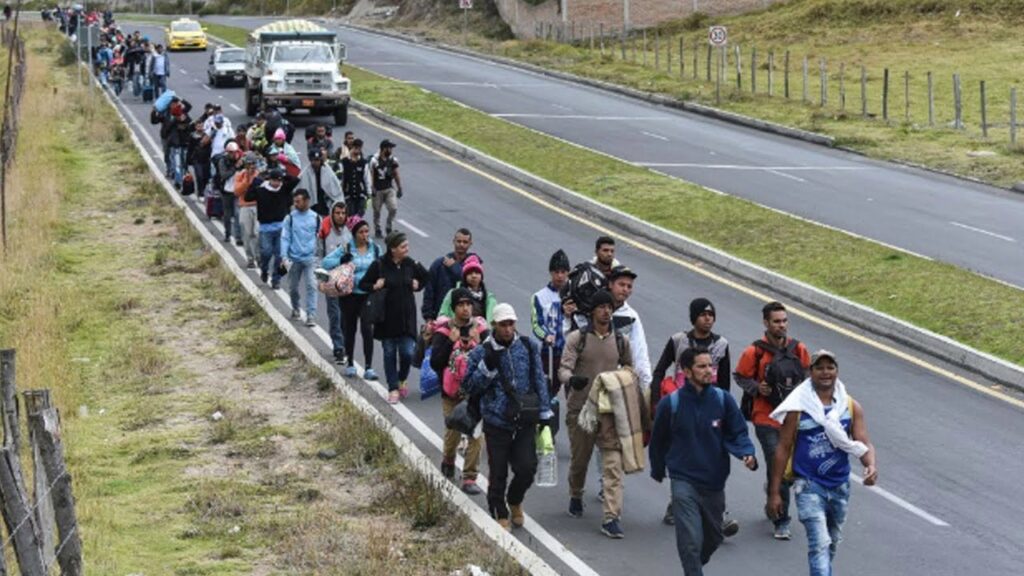SANTIAGO — The northern Chilean village of Colchane near the Bolivia border is seeing a fast-developing situation due to unrest among migrants, mostly from Venezuela, who are neither being allowed to enter Chile nor return to Bolivia.
The scenario is linked to newly implemented migration legislation that requires migrants to self-report to a border facility in Colchane for a compulsory screening on their criminal records. However, some migrants who have been denied entry into Chile are also being denied entry back into Bolivia on claims of having entered Chile with an irregular migration status.
The situation has caused the Colchane migrant center to collapse, with local authorities indicating they do not have the resources to respond to the needs of the growing migrant population. Additionally, various migrants have taken to blocking transit along international routes to demand respect for their rights.
The governments of Bolivia and Chile report they will form a working group to address the ongoing situation and its implications on security and health, among other concerns. The UN in Chile, who has condemned recent acts of aggression against the migrants, is working to set up temporary housing in Colchane and nearby Iquique through a US$3.5 million allocation to be managed by IOM and UNHCR.
The Chilean government declared a state of emergency in northern communities of Arica, Parinacota, Tamarugal and El Loa effective 14 February. These areas have seen a steady flow of migrants seeking to enter Chile since 2020, with most using irregular crossings braving the unforgiving cold of routes as high as 4,000m above sea level. Authorities indicate at least 20 migrants have perished due to the extreme cold since 2020.
REGIONAL: STORMS & FLOODING
KEY FIGURES
– $296K ALLOCATED BY IFRC TO RESPOND TO FLOODING IN ECUADOR
– 73K FAMILIES ACROSS BOLIVIA AFFECTED BY SEASONAL RAINS
ECUADOR
The International Federation of Red Cross and Red Crescent Societies (IFRC) issued a Plan of Action to support the Ecuadorian Red Cross in responding to the effects of the recent flooding in Quito and other provinces. Per IFRC, the flooding has so far affected 7,270 people. The US$296,745 allocation is targeting 2,750 people in Cotopaxi, Guayas and Pichincha with assistance for three months. The allocation comes amid forecasts that rains will continue across Ecuador over the next three months due a wet front over the Amazon that could strengthen rainfall and continue triggering flooding and landslides.
BRAZIL
Brazil continues to experience the effects of pounding rains, with authorities reporting that recent floods and landslides in the northwestern Rio de Janeiro municipality of Miracema have affected 15,000 people and displaced 1,400. The nearby Laje do Muriaé municipality also reports widespread flooding after the Muriaé river broke its banks, affecting some 900 people and displacing 500.
BOLIVIA
Seasonal rains continue to affect eight of Bolivia’s nine departments, with the number of affected families rising from 65,000 as of 3 February to more than 73,000 families as of 10 February. National and sub-national authorities continue to provide humanitarian aid.
GUATEMALA
Per the National Coordinator for Disaster Reduction (CONRED), recent storms in communities in the departments of Alta Verapaz, Izabal and Petén have affected some 840 people. CONRED is coordinating the delivery of humanitarian supplies.
DOMINICAN REPUBLIC
Storms and high winds have been affecting the Dominican Republic since 7 February, leading to flooding and landslides that have left some 223,000 people without drinking water, damaged 50 homes and displaced about 250 people.
REGIONAL: COVID-19
KEY FIGURES
Cases, deaths & people vaccinated (13 Feb)
Total cases 63,036,179 +3.1% from 6 Feb
Total deaths1,625,903 +1.0% from 6 Feb
People vaccinated 483,039,121 +1.0% from 6 Feb
(% of pop) 73.7% +0.8% from 6 Feb
Fully vaccinated 420,458,825 +1.0% from 6 Feb
(% of pop) 64.1% +0.6% from 6 Feb
Sources:
• Our World in Data
• Pan-American Health Organization (PAHO)
PAHO indicates that COVID-19 cases have fallen by a third in the Americas (including the United States and Canada) but warns that health care systems and workers are still facing daunting challenges due to the sheer volume of cases brought about by Omicron. Overall, the regional trend of note for PAHO is that countries with higher vaccination coverages are seeing lower admissions to intensive care units (ICUs) and hospitals.
While infections are notably slowing down in Central America, South America and the Caribbean save for St. Vincent and the Grenadines and Dominica, deaths continue to rise in these sub-regions, as are hospitalizations in South America’s Southern Cone. PAHO is especially concerned with elevated rates of depression and overall psychological distress among health care professionals.

